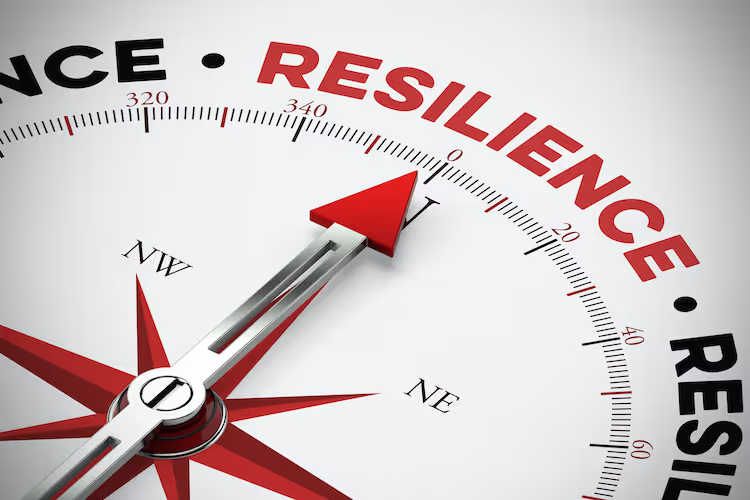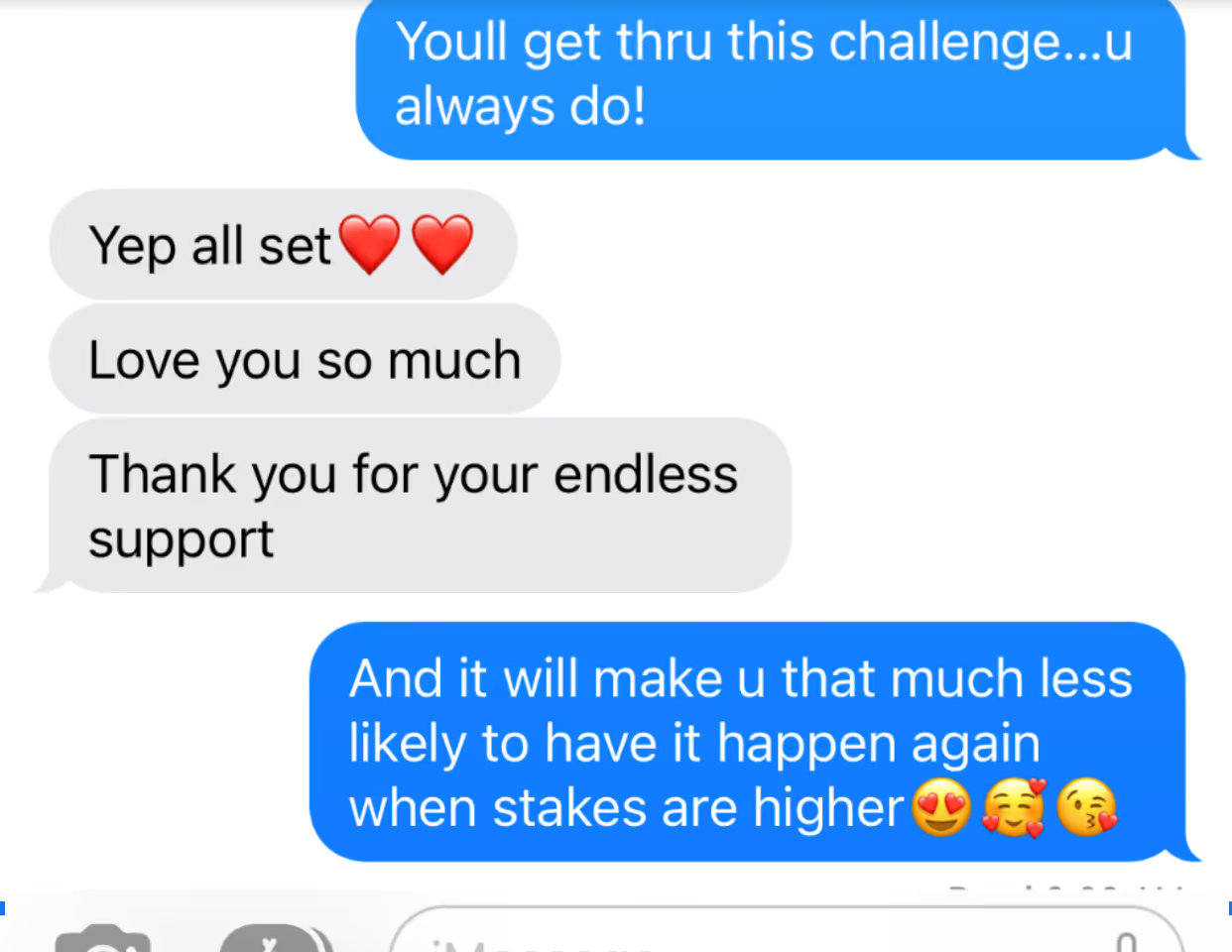


Life, both online and off, is full of setbacks. It just is.
Resiliency is the ability to recover after a setback. For example, you’re a teen and nervously post a video of something you did over Thanksgiving break. You’re nervous because unlike posting a photo where you can put your settings such that people won’t be able to put likes, you can’t do that for videos. Now you feel vulnerable — what if people don’t respond to your video? In fact, let's say that over the next 48 hours, only a few people like it. You feel crappy.
The teen’s brain will need to dig into their resiliency tool belt. They might grab the “strategic self-talk” apparatus and say something like, “Good for me for keeping this video up rather than taking it down because I like it. I am posting with integrity, and that is what counts, not the number of likes”.
Setbacks, of course, can be much more intense. Perhaps a teen’s girlfriend broke up with them over Thanksgiving break — that sucks. The list goes on.
As parents, we have trillions of atoms in our bodies that want to relieve our kids' suffering. Sometimes they allow us to help, and other times they want nothing to do with our help.
What I offer today is an action we can do to build their resiliency. It is all about casually mentioning a time when they have overcome adversity. The key is that this is not done in response to a current challenge but to say something out of the blue.
One of the most important resiliency tools we all carry in our tool belts is the act of remembering past times we got through challenges. The problem is doing it during setbacks, and those times don’t readily come to mind.
When as adults, we take a few minutes to mention times that we saw our kids rebound, we are deepening their ability to recall such times when it is really needed.
And what is great about this move is that when they are not in the midst of a dilemma, they may be more receptive to hearing our observations.
Learn more about showing our movies in your school or community!
Join Screenagers filmmaker Delaney Ruston MD for our latest Podcast

Learn more about our Screen-Free Sleep campaign at the website!
Our movie made for parents and educators of younger kids
Learn more about showing our movies in your school or community!
Remember when we were all arguing so much about video gaming? How angry and upset were you that we wanted you to have a more varied life? Well, I just remembered what a hard time that was and how you decided to try the school newspaper on your own accord. You could have just stayed upset, and yet you pivoted and looked for solutions, and it has been really cool to see you continue to give this new gig with the paper a try. Your willingness to try new things is a great strength that will serve you well when life serves you with curve balls. I just wanted to say that.
Aside from this resiliency inoculation exercise I just mentioned, there will be times when our kids will indeed appreciate our being cheerleaders for them in real-time. In fact, as I was writing this today, one such moment happened.
Learn more about showing our movies in your school or community!
Join Screenagers filmmaker Delaney Ruston MD for our latest Podcast

Learn more about our Screen-Free Sleep campaign at the website!
Our movie made for parents and educators of younger kids
Join Screenagers filmmaker Delaney Ruston MD for our latest Podcast
This morning my daughter, husband, and I got to the San Francisco airport at 4:30 am. Peter and I were headed back to Seattle, and our daughter was on a different flight headed back to college. As I sat on the plane about to depart, I got a call from Tessa. She had not realized she had been waiting at the wrong gate and she missed her flight. We spoke briefly on the phone and then exchanged these texts. (My texts are in blue)

1. What does the word resiliency mean to you?
2. When was the last time you got through a challenge? (Have the whole family give an example)
3. What things did you do to help get through it?
As we’re about to celebrate 10 years of Screenagers, we want to hear what’s been most helpful and what you’d like to see next.
Please click here to share your thoughts with us in our community survey. It only takes 5–10 minutes, and everyone who completes it will be entered to win one of five $50 Amazon vouchers.
Life, both online and off, is full of setbacks. It just is.
Resiliency is the ability to recover after a setback. For example, you’re a teen and nervously post a video of something you did over Thanksgiving break. You’re nervous because unlike posting a photo where you can put your settings such that people won’t be able to put likes, you can’t do that for videos. Now you feel vulnerable — what if people don’t respond to your video? In fact, let's say that over the next 48 hours, only a few people like it. You feel crappy.
The teen’s brain will need to dig into their resiliency tool belt. They might grab the “strategic self-talk” apparatus and say something like, “Good for me for keeping this video up rather than taking it down because I like it. I am posting with integrity, and that is what counts, not the number of likes”.
Setbacks, of course, can be much more intense. Perhaps a teen’s girlfriend broke up with them over Thanksgiving break — that sucks. The list goes on.
As parents, we have trillions of atoms in our bodies that want to relieve our kids' suffering. Sometimes they allow us to help, and other times they want nothing to do with our help.
What I offer today is an action we can do to build their resiliency. It is all about casually mentioning a time when they have overcome adversity. The key is that this is not done in response to a current challenge but to say something out of the blue.
One of the most important resiliency tools we all carry in our tool belts is the act of remembering past times we got through challenges. The problem is doing it during setbacks, and those times don’t readily come to mind.
When as adults, we take a few minutes to mention times that we saw our kids rebound, we are deepening their ability to recall such times when it is really needed.
And what is great about this move is that when they are not in the midst of a dilemma, they may be more receptive to hearing our observations.
Remember when we were all arguing so much about video gaming? How angry and upset were you that we wanted you to have a more varied life? Well, I just remembered what a hard time that was and how you decided to try the school newspaper on your own accord. You could have just stayed upset, and yet you pivoted and looked for solutions, and it has been really cool to see you continue to give this new gig with the paper a try. Your willingness to try new things is a great strength that will serve you well when life serves you with curve balls. I just wanted to say that.
Aside from this resiliency inoculation exercise I just mentioned, there will be times when our kids will indeed appreciate our being cheerleaders for them in real-time. In fact, as I was writing this today, one such moment happened.
This morning my daughter, husband, and I got to the San Francisco airport at 4:30 am. Peter and I were headed back to Seattle, and our daughter was on a different flight headed back to college. As I sat on the plane about to depart, I got a call from Tessa. She had not realized she had been waiting at the wrong gate and she missed her flight. We spoke briefly on the phone and then exchanged these texts. (My texts are in blue)

1. What does the word resiliency mean to you?
2. When was the last time you got through a challenge? (Have the whole family give an example)
3. What things did you do to help get through it?
Sign up here to receive the weekly Tech Talk Tuesdays newsletter from Screenagers filmmaker Delaney Ruston MD.
We respect your privacy.
Life, both online and off, is full of setbacks. It just is.
Resiliency is the ability to recover after a setback. For example, you’re a teen and nervously post a video of something you did over Thanksgiving break. You’re nervous because unlike posting a photo where you can put your settings such that people won’t be able to put likes, you can’t do that for videos. Now you feel vulnerable — what if people don’t respond to your video? In fact, let's say that over the next 48 hours, only a few people like it. You feel crappy.
The teen’s brain will need to dig into their resiliency tool belt. They might grab the “strategic self-talk” apparatus and say something like, “Good for me for keeping this video up rather than taking it down because I like it. I am posting with integrity, and that is what counts, not the number of likes”.
Setbacks, of course, can be much more intense. Perhaps a teen’s girlfriend broke up with them over Thanksgiving break — that sucks. The list goes on.
As parents, we have trillions of atoms in our bodies that want to relieve our kids' suffering. Sometimes they allow us to help, and other times they want nothing to do with our help.
What I offer today is an action we can do to build their resiliency. It is all about casually mentioning a time when they have overcome adversity. The key is that this is not done in response to a current challenge but to say something out of the blue.
One of the most important resiliency tools we all carry in our tool belts is the act of remembering past times we got through challenges. The problem is doing it during setbacks, and those times don’t readily come to mind.
When as adults, we take a few minutes to mention times that we saw our kids rebound, we are deepening their ability to recall such times when it is really needed.
And what is great about this move is that when they are not in the midst of a dilemma, they may be more receptive to hearing our observations.


Catherine Price’s “Rebel's Code” focuses on intentional technology use and prioritizing real-world friendship, freedom, and fun. Her book The Amazing Generation, co-written with Jonathan Haidt, introduces these concepts to children through interactive formats and teen perspectives. Research indicates that when adolescents understand how platforms are designed to exploit attention, they show greater motivation to limit their social media use.
READ MORE >
Many adults keep their phones by the bed — it feels harmless, even necessary. But what if that habit is quietly affecting our sleep and the example we set for our kids? In this week’s blog, Dr. Ruston shares two key things every parent should know about sleeping next to a phone, and how small nighttime tech changes can make a big difference for the whole family.
READ MORE >for more like this, DR. DELANEY RUSTON'S NEW BOOK, PARENTING IN THE SCREEN AGE, IS THE DEFINITIVE GUIDE FOR TODAY’S PARENTS. WITH INSIGHTS ON SCREEN TIME FROM RESEARCHERS, INPUT FROM KIDS & TEENS, THIS BOOK IS PACKED WITH SOLUTIONS FOR HOW TO START AND SUSTAIN PRODUCTIVE FAMILY TALKS ABOUT TECHNOLOGY AND IT’S IMPACT ON OUR MENTAL WELLBEING.
